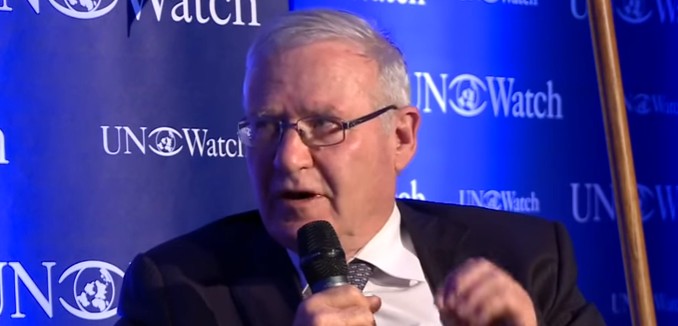Israel’s chief of military intelligence in 2007 said in a press briefing hosted by The Israel Project Wednesday that the Israeli Air Force’s destruction of a Syrian reactor shows that when Israel is faced with “a very serious threat” to its existence, “Israel is going to act, and act even if Israel has to act alone.”
Maj-Gen. (Ret.)Amos Yadlin, who currently heads the Institute for National Security Studies, observed that he is probably the only person to be involved in the destruction of two nuclear reactors being built by Israel’s enemies. In 1981, he was one of the pilots who participated in the raid on the Iraqi reactor, and in 2007 he was head of military intelligence for the strike against the Syrian reactor, known as Operation Orchard.
He said that operating in the latter capacity was more difficult. In 1981 as a fighter pilot, his job was to “aim the gun sights on the target,” which he acknowledged was not easy, but it was the job he was trained to do. As chief of military intelligence, when Israel learned of the reactor, he needed to figure out when the reactor would be operational, at which point Israel could no longer strike, and know what the consequences of the strike might be, including the possibility that Syria would launch an all-out war with Israel.
Yadlin explained that a reason for not explicitly taking credit previously was to not give Syrian President Bashar al-Assad a pretext to strike back at Israel. Two things have changed since then, as he explained, making publication of the details unlikely to provoke a response from Assad. The first is that Assad is now fighting for his survival in a civil war and it would make no sense for him to open a new front with Israel. The second change is that Israel has, in fact, struck targets in Syria many times in recent years to prevent Hezbollah from obtaining “game-changing” weapons and Iran from establishing a significant presence in Syria, and Assad has not responded to these attacks.
A complete recording of the call with Yadlin is available here.
In a separate press briefing, The Israel Project hosted Dr. Ronen Bergman, author of the recently published ‘Rise and Kill First’ and senior correspondent for Military and Intelligence Affairs for Yedioth Ahronoth. Bergman cited two reasons why he felt the account of Operation Orchard was declassified now. The first, as he explained, is that so many details have previously been published outside of Israel that the military censor felt it could no longer defend keeping the matter classified if it had to defend itself in court. The second reason Bergman cited was to send a message that “when Israel is left alone it reacts and with extreme force.”
Bergman drew a parallel between 2007 and 2018. In 2007, Israel had asked the United States to fulfill its commitment to protect Israel by destroying the reactor. But despite close ties between then-Israeli Prime Minister Ehud Olmert and then President George W. Bush, as well as other top officials of the two countries, the U.S. refused to attack. Currently, the Israeli government is trying to get the Trump administration to prevail upon Russia to restrain Iran from establishing bases in Syria, which Israel sees as its “main strategic threat.”
Bergman said that he found illuminating that if one pays attention to the communications between commanders of the military and top political figures in 2007, “they reflect a mindset of an existential threat, not just to Israel, but to the Jewish people,” and that they saw destroying the Syrian reactor as “vital to the survival of the Jewish nation and the Jewish people.” He said that studying these reactions is important to understanding Israel as it reflects the views of non-political military professionals who saw the reactor as an existential threat.”
A complete recording of the call with Bergman is available here.
Current IAF chief Maj. Gen. Amikam Norkin recalls the attack on the reactor (English subtitles):
The IAF provided the operational details of the strike on the Syrian reactor. The Times of Israel provided an account that covered other details of the strike and speculation as to why the attack was declassified now.
[Photo: unwatch / YouTube ]




